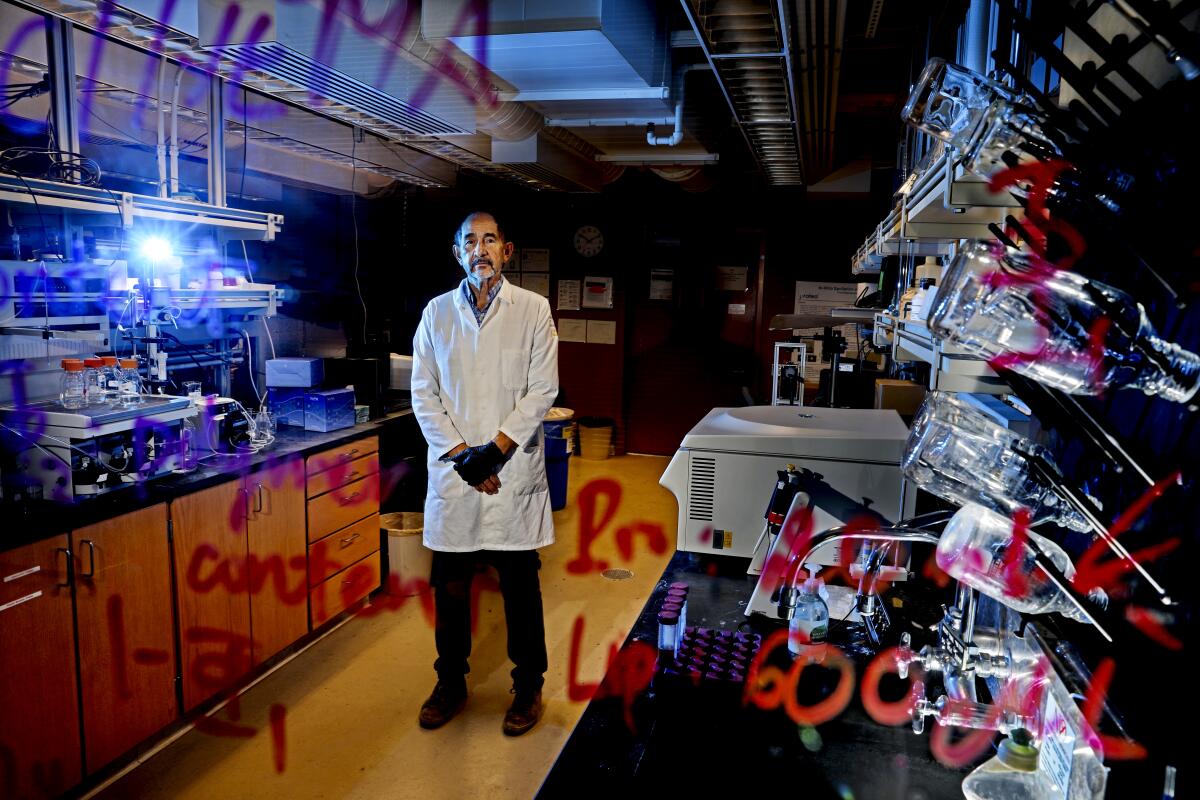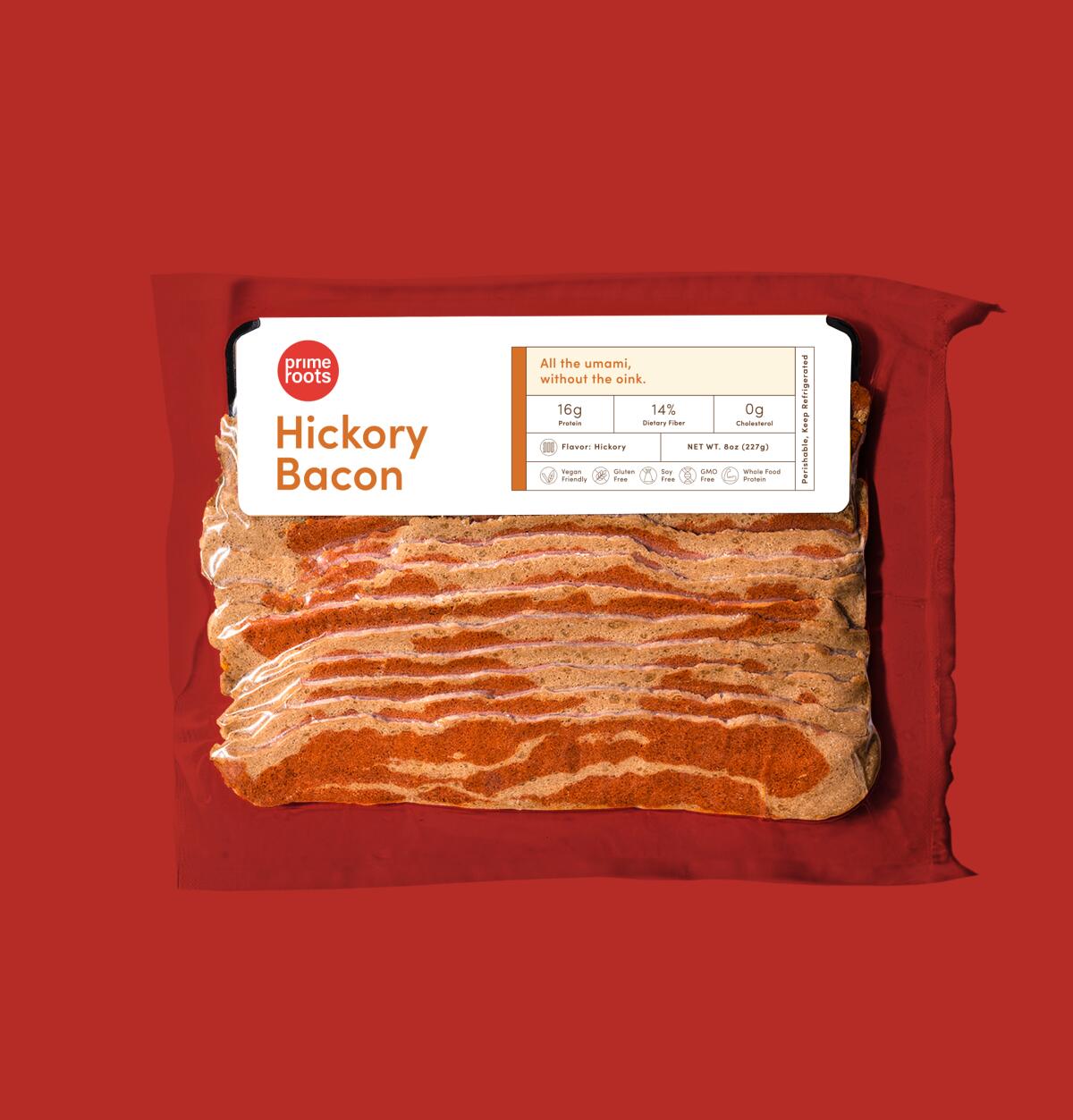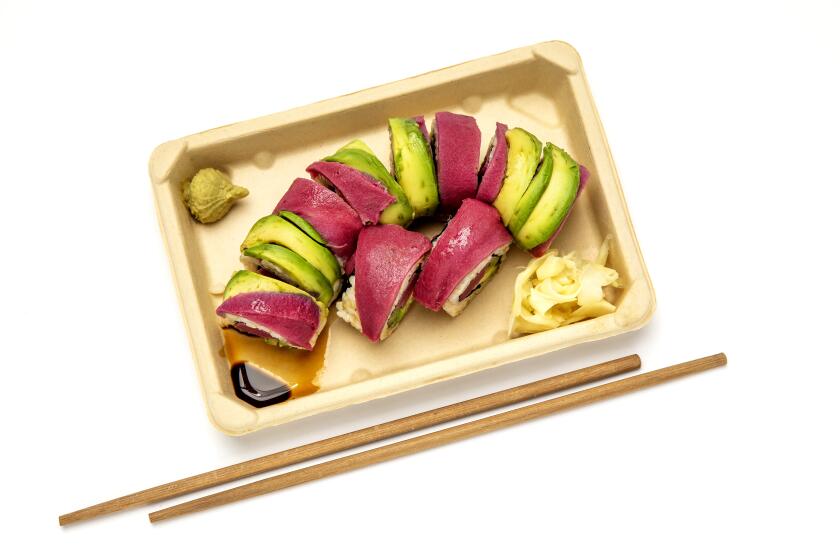At Berkeley’s Alt: Meat Lab, some students learn to be CEOs

This story is part of our series on the future of cultured and plant-based meat. Read more here.
In 2018, Kimberlie Le spent four months sleeping in an office that belonged to a San Francisco startup incubator called IndieBio. She was working with Josh Nixon, another former UC Berkeley student, to perfect their recipe for plant-based salmon burgers, and she was “babysitting” a tank of koji, the fungus that’s key to the fermentation of foods like miso and sake.
Koji, as it turns out, grows in long microscopic fibers similar to those of chicken breast, and its neutral taste means it can be mixed with a variety of flavorings to taste like almost anything — even seafood.
Today, Le, 26, is CEO and co-founder of Prime Roots, a direct-to-consumer business selling koji-based sausage paella, lobster ravioli and other meals online. It’s best known for its vegan bacon, which is shaped into a log that resembles pork belly and is then smoked and sliced with a meat slicer. It’s “basically as farm-to-table as you can get,” she says.
The list of meat mimics — plant-based, cultured, fungi-based — is mushrooming.
Prime Roots has a team of 35 employees, a 20,000-square-foot production facility in West Berkeley and $18.5 million in funding. Its original creation — a seafood alternative — was born at UC Berkeley’s Alt: Meat Lab, a program that connects students interested in creating plant-based alternatives to animal products with potential investors. Le and Nixon are two of several alumni to have founded startups.
Le joined the lab’s inaugural class in 2017 and learned — through fellow microbiology and environmental science students — about the environmental impact of industrial meat production. As someone who couldn’t find good-tasting substitutes for her favorite meats, she thought it might be her chance to make a difference. “It’s a very interesting problem that I thought was easily solved with better products,” she says.
Ricardo San Martin co-founded the Alt: Meat Lab, housed at Berkeley’s Sutardja Center for Entrepreneurship and Technology, to teach students about both science and entrepreneurship — a combination he says is rare in academics. Impossible Foods and Beyond Meat had recently come on the scene, and alternative proteins seemed like a relevant research topic.
“We think plant-based is the way to go, but there’s a lot of work to be done to improve these existing products and make them more appealing to people,” San Martin says. “The quest for more sustainable, affordable foods is what drives us.”

The students who participate in the lab each year get involved in two ways: They enroll in courses offered in the fall or spring, and they can apply to conduct paid or for-credit research in the lab.
In the fall, Anne Fletcher teaches Product Design and Customer Needfinding. The class gets a challenge from an Alt: Meat Lab sponsor — one year, Nestlé asked for product proposals for low-cost products — and students organize in teams to find a solution. Through ethnographic interviews, students try to understand why people might choose alternatives to meat and then present a business plan based on their findings.
Not all of these students are vegan or vegetarian, and some of them study business or marketing rather than science. To get the most from the class, they have to “get out of their own set of beliefs and understand that not everyone thinks that yogurt is healthy or unhealthy, and neither of those is necessarily correct,” Fletcher says.
We tried more than 25 alt-protein burger, sausage, chicken nugget and fish products. Here’s a breakdown of the best and worst
In the spring, San Martin teaches Product Design of Plant-Based Foods. As in Fletcher’s course, students team up to address an industry challenge — but their work is lab-based. Nestlé might ask them to solve the issue of dryness in plant-based meat, or Miyoko’s Creamery, a Sonoma-based company that specializes in dairy-free products, might challenge them to make vegan cheese that melts and stretches. Students then spend the semester developing a prototype of a plant-based product.
When Le took the class, she had to create a seafood alternative. Holed up in her apartment kitchen, she experimented with various fungi, including koji, and combined them with algae to mimic seafood flavor. Using her pressure cooker, she developed a salmon burger that, to her delight, people said made the room smell like fish.
Companies are flocking to alt-protein central — California
San Martin’s course culminates in a final presentation day, when the teams present their work in front of investors, industry leaders and other judges. To stand out, students’ prototypes can’t just be free of animal products, San Martin says. They must balance the lab’s core principles of sustainability, affordability, minimal processing, nutrition and cultural relevancy.
Representatives from Collaborative Fund (which invested in Impossible Foods and Beyond Meat) were in the audience when Le’s group presented. They encouraged the team to apply for the accelerator program at IndieBio, which would give them $250,000 and four months’ access to lab space, a mentor network and other resources they would need to turn their idea into a business. Later, the firm became one of Prime Roots’ main investors.
The Alt: Meat Lab has nurtured other success stories. Former students of San Martin founded Black Sheep Foods, which plans to roll out its ground lamb alternative made from pea protein in the coming months. Other alumni have gone on to work for food-tech organizations, such as the Every Co., or invest in the alt-meat industry through positions at venture capital firms, including Andreessen Horowitz.
Sundial Foods co-founders Jessica Schwabach, 21, and Siwen Deng, 29, connected with Nestlé through the Alt: Meat Lab in 2019. They spent the following year at the company’s R+D Accelerator in Lausanne, Switzerland, collecting consumer feedback on their chickpea-based chicken wings. Sundial plans to launch the wings at Bay Area restaurants next year.
Before taking San Martin’s class, Schwabach had planned to go to medical school and Deng had wanted to become a professor.
“Neither of us had any belief that we could be entrepreneurs of any sort — and definitely not ones focused on vegan meat — but it just all snowballed really fast once we met each other,” Schwabach said.
“A lot of it is because of Ricardo. He talked about the market opportunity for plant-based [meat] and made the students realize that this is a real thing that’s happening right now and that we could actively contribute to it. The way that he inspires students is insane.”
More to Read
Eat your way across L.A.
Get our weekly Tasting Notes newsletter for reviews, news and more.
You may occasionally receive promotional content from the Los Angeles Times.













